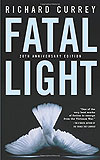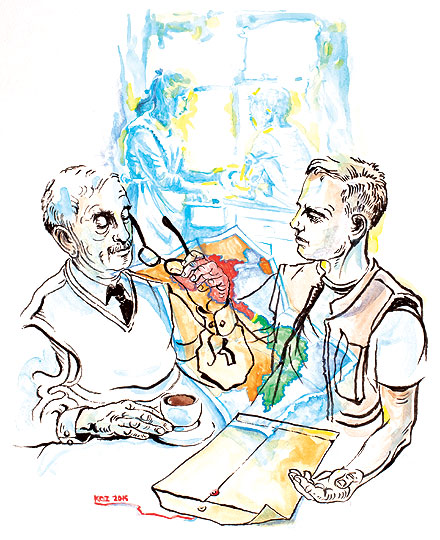 |
||||||||||||
|
March/April 2015
In the morning I came into the living room in a pair of jeans and unlaced basketball shoes. No shirt, no socks. My grandfather spoke from behind the morning newspaper. “You were going to sleep all day?” I fell into the cushioned love seat opposite him. His feet were on an ottoman, ankles crossed. “Not all day,” I said. “Guess I needed the rest.” He flipped one corner of the newspaper, looked across at me. “Left some breakfast for you. On the stove. You’ll have to reheat the coffee.” “Thanks.” He folded the newspaper, dropped his left foot to the floor, tossed the newspaper onto the ottoman. He was dressed as he had dressed for business: charcoal vest, gray knit tie, pinstripe trousers, starched white sleeves rolled away from the veined hands. “Call home?” “Tried to call Mary. No answer.” I stepped to the tall windows that faced the porch and the street. A cement truck rumbled by, orange mixer turning a company logo into morning sun. HYDE CONSTRUCTION, round and round. “And you were relieved.” I was surprised, looking back at Earl. “Yeah,” I said quietly. “I was.” He dropped his right foot from the ottoman, leaned forward, elbows on knees. “Better call your folks. They’ll be waiting to hear from you.” “I should get some of that breakfast. Before it’s too cold.” I moved to the doorway. “Listen—” I stopped, my back to him, thinking I knew what he would say. I waited and he did not speak and I turned to face him. He said, “Is it hard coming back?” He looked straight into my eyes. “Yes,” I said. “It is.” I averted my gaze. He pushed up from his chair, reached his crutches where they leaned against the mantel, positioned them under his arms. “Must be mighty hard.” “Let’s go in the kitchen,” I said. He nodded. “I’m right behind you.” Earl had left scrambled eggs and bacon and an English muffin face-down in a skillet. “Put a little fire under that if you want,” he said, following me into the kitchen. “It’s OK. I’ll just heat the coffee.” I struck a wooden kitchen match on the side of the matchbox he kept above the stove, lit a burner and put the coffeepot over the flame. “Sure. Only had about half a cup this morning.” I put a cup and saucer in front of him. Clean spoon on a folded napkin. The way he liked it. “Watching how much coffee you drink these days?” “Oh, hell. Doc’s got me cutting back on everything you can think of.” I slid eggs, bacon, and muffin onto the plate. The coffeepot was the same dented aluminum percolator my grandmother had used. I poured for my grandfather. “You take milk, don’t you?” “Jesus, boy, what self-respecting person would put milk in coffee?” He waved at the refrigerator. “There’s some cream in there.” I found the cream in a miniature milk bottle with a fluted paper cap. Earl put some in his coffee, stirred. “Coffee was meant to be drunk with cream.” I grinned. My grandfather studied me. “You don’t put on clothes when you come to the table anymore?” I had a forkful of eggs in my mouth. I stopped chewing. “Eats cold food and comes to the breakfast table naked. This what war does for a man?” I swallowed the eggs. “I’ll be right back,” I said. Earl shrugged, lifted his eyebrows. “Common decency.” He sipped coffee. I took the stairs at an easy run, the dark hall to my bedroom, and put on a fatigue jacket. The manila envelope of pictures was on the bed. I hesitated, picked up the envelope. Is it hard coming back? In the kitchen I put the envelope on the table. My grandfather looked at the olive green T-shirt I’d put on. “Not a hell of a great improvement. But better.” He gestured with his chin at the envelope. “What’s that?” “Pictures.” “Vietnam? You took them?” I nodded. “Vietnam.” He slipped the stack of photos out of the envelope and looked at the first one. After a moment he said, “Christ, are these bodies? Look like legs sticking out. There at the bottom. “ “We threw garbage bags over their heads. Only thing we had at the time.” He took the picture in his right hand, holding it at bifocal length and angle. “Three men,” he said. “What were they doing there, right in the middle of your camp?” “They came at us over the wire, yelling and screaming, shooting up the place.” My grandfather squinted. “Just three?” “Just three. Strange.” He looked back at the picture. “Maybe,” he said, “it was one of those last-ditch heroic gestures. You know, three men, don’t have a snowball’s chance in hell anyway, so they just go on in—” “—and survive about thirty seconds.” He shrugged, putting the picture aside to look at the next one. “Well, who knows,” he said. “Hard to say what moves people. Their choice might have made as much sense as anything right at that moment.” He studied the next picture, and looked up at me. “Why would you take a picture like this?” He turned the photo so I could see it. I told him it was for proof. “Proof?” “We found him like that.” “Strung up by his feet in a tree? His head cut off?” “We knew the guy. Found his head a few feet away. He was a Viet Cong cadre leader.” My grandfather watched my face. “You’re telling me this was done by our people?” “Maybe not Americans. But yeah, our side.” He shook his head. “What the hell’s going on over there?” I shrugged. “It’s a war.” My grandfather poured coffee into his cup and mine. “Is that supposed to explain something?” “Would you have believed me if I just told the story? Without the pictures?” He pursed his lips, thinking. After a moment he said, “Probably not. War stories and fish stories, right?” “Right.” He nudged the picture of the decapitated man. “And maybe,” he said, “you should have just let me go on thinking that.” I took a drink of coffee as my grandfather picked up another photo. “Hey,” he said. “Look at this.” I leaned to see the shot of a hooker I took in Da Nang. She had opened her shirt to the camera, grinning broadly. “Yeah, I went to snap the picture, by the time I got the camera up she was showing me what she had.” “Which isn’t much.” “Well,” I said, “she’s happy.” He began to study another picture. Through the antique four-paned windows I looked off to boxcars lined under the floodwall. The river rode the Ohio shore, and I remembered my mother standing at the sink during the months my father was gone on his second enlistment, in Korea. She stood pregnant with my youngest sister, blue-print housedress seamed over her grown belly, watching out the window as she washed dishes, across the backyard slot of rusting clothesline and fallow town garden, thin winter sun melting old snow out of the coal gondolas in the switching yard. She turned the dime-store plates and cups in and up and through the rinse, watching two open-end freights jerk slowly toward each other in the frame of the window. SOO LINE. ILLINOIS CENTRAL. CHESSIE. SNOW GOOSE. ERIE LACKAWANNA. CANADIAN CENTRAL. The freights rocked toward each other and she sat me on the drain board to watch. On one afternoon we saw a derelict materialize out of the blank doorway of an orange boxcar, hesitate, his crushed Borsalino riffling in the slow air the freight made, and he jumped, sliding into a culvert and out of sight. The two trains coupled in a soft but terrible force we felt even that far away in the closed kitchen, rattling the big windows, and then the trains were still and my mother stopped moving her hands in the water and in the silence I heard her holding her breath. “Now this one,” my grandfather said quietly, nodding down at a photograph, “this one is just plain beautiful.” He slid the picture toward me across the red-and-white tablecloth and sipped his coffee. In the picture a huge Chinook helicopter came down in twilight mist. Everything in the frame was a ghosted shape except one face, an anonymous soldier looking out at the camera with eyes lit by sunset and angle and deep mystery, one open face watching from a home in chaos and distance. My grandfather poured more cream into his coffee, stirred twice, and replaced his spoon across the saucer’s lip. “Simply beautiful,” he said. “You took that one?” “Yeah. One of those moments.” “Damn fine moment.” I looked at the picture. “Listen,” my grandfather said. “Tell me something. You plan to show these pictures. . .to anyone else?” I blinked. “Haven’t really thought about it.” “Don’t do it. Put these in a shoebox somewhere.” I stacked the pictures, returning them to their envelope, and he kept his eyes on his coffee cup, pushing his spoon back and forth on the saucer. The spoon made a small empty sound against the high ceiling. “They’re too damned hard,” he said. “Too. . .I don’t know. Too true.” He looked up at me. “I’m glad I saw them. But I don’t know that anybody else would be.” Shifting his gaze to the window he said, “Nobody’s ready. You know what I’m saying?” I watched his face a moment. “I know,” I said.
|
||||||||||||
|
|
||||||||||||
|
||||||||||||
8719 Colesville Road, Suite 100, Silver Spring. MD 20910 | www.vva.org | contact us |
||||||||||||














